Have you ever stood
In the darkness of night
Screaming silently
You're a man
Have you ever hoped
That a time would come
When your voice could be heard
In a noon-day sun
Have you waited so long
'Til your unheard song
Has stripped away your very soul.
Well then, believe it my friend
That this silence will end
We'll just have to get guns
And be men
Has a cry to live
When your brain is dead
Made your body tremble so
And have unseen chains
Of too many years
Hurt you so bad 'til you can't shed tears
Have so many vows
From so many mouths
Made you know that words are just words
Well then, believe it my friend
That this silence will end
We'll just have to get guns
And be men.
You know that dignity
Not just equality
Is what makes a man a man
And so you laugh at laws
Passed by a silly lot
That tell you to give thanks
For what you've already got
And you can't go on
With this time-worn song
That just won't change the way you feel.
Well then, believe it my friend
That this silence will end
We'll just have to get guns
And be men.
You don't want to think
You just want to drink
Both the sweet wine and the gall
You been burning inside
For so long a while
'Til your old time grin
Is now a crazed man's smile
And the goal's so clear
And the time so near
You'll make it or you'll break the plow
Well then, believe it my friend
That this silence will end
We'll just have to get guns
And be men
Yes it's time you know
Who you really are
And not try whitewash the truth
You're a man you see
And a man must be
Whatever he'll be or he won't be free
If he's bound up so tight
He'll hold back the night
And their won't be no light for day
Well then, believe it my friend
That this silence will end
We'll just have to get guns
And be men.
In the darkness of night
Screaming silently
You're a man
Have you ever hoped
That a time would come
When your voice could be heard
In a noon-day sun
Have you waited so long
'Til your unheard song
Has stripped away your very soul.
Well then, believe it my friend
That this silence will end
We'll just have to get guns
And be men
Has a cry to live
When your brain is dead
Made your body tremble so
And have unseen chains
Of too many years
Hurt you so bad 'til you can't shed tears
Have so many vows
From so many mouths
Made you know that words are just words
Well then, believe it my friend
That this silence will end
We'll just have to get guns
And be men.
You know that dignity
Not just equality
Is what makes a man a man
And so you laugh at laws
Passed by a silly lot
That tell you to give thanks
For what you've already got
And you can't go on
With this time-worn song
That just won't change the way you feel.
Well then, believe it my friend
That this silence will end
We'll just have to get guns
And be men.
You don't want to think
You just want to drink
Both the sweet wine and the gall
You been burning inside
For so long a while
'Til your old time grin
Is now a crazed man's smile
And the goal's so clear
And the time so near
You'll make it or you'll break the plow
Well then, believe it my friend
That this silence will end
We'll just have to get guns
And be men
Yes it's time you know
Who you really are
And not try whitewash the truth
You're a man you see
And a man must be
Whatever he'll be or he won't be free
If he's bound up so tight
He'll hold back the night
And their won't be no light for day
Well then, believe it my friend
That this silence will end
We'll just have to get guns
And be men.
envoyé par Bernart Bartleby - 16/2/2017 - 20:53
LIBERATO DOPO 42 ANNI UN ESPONENTE DEL MOVE
Gianni Sartori
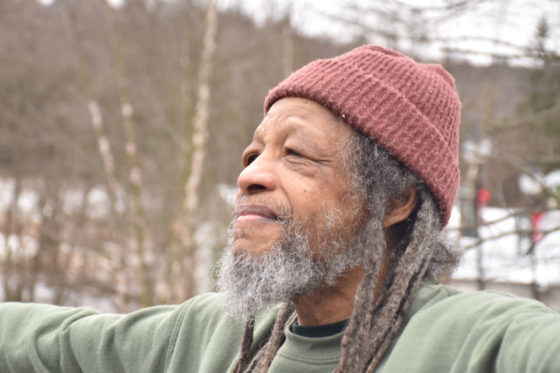
Verso la metà degli anni novanta del secolo scorso (mi pare nel 1997) avevo incontrato alcuni esponenti del MOVE a Bassano nella sede del Centro sociale (poi demolito) “Stella Rossa”. Ramona Africa mi spiegò che tutti i militanti del MOVE rinunciavano al nome precedente in quanto evocava la condizione di schiavi dei loro antenati (come fece anche Malcom X) e aggiungevano al nome proprio, come rivendicazione di appartenenza comunitaria, familiare, il cognome “Africa”.
Da ex operaio rimasto intossicato da colle e vernici sul lavoro, avevo particolarmente apprezzato che prima della conferenza i militanti afro-americani avessero richiesto di non fumare durante la stessa. Anche “per rispetto dell’aria”, non solo delle vie respiratorie dei presenti. All’epoca molte riunioni di “soggetti antagonisti” si svolgevano ancora avvolte in asfissianti nuvole di fumo, non proprio come negli anni sessanta e settanta (vere camere a gas), ma comunque nocive quanto basta. Oltre all’intervista con Ramona Africa e Sue Africa di quel pomeriggio conservo un opuscolo “25 years on the move” (pubblicato nel 1996) con sulla quarta di copertina la foto dell’arresto di un militante del MOVE: Delbert Africa
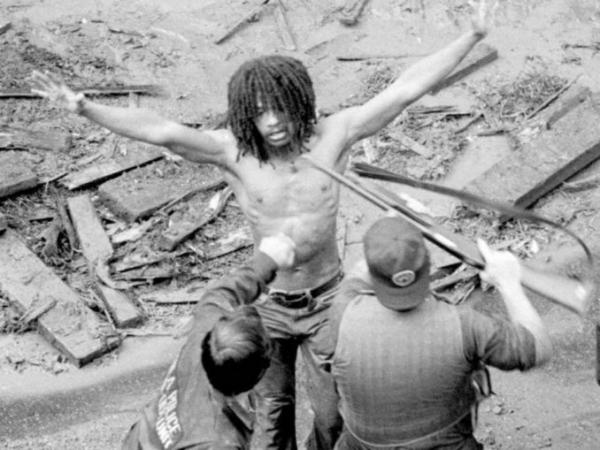
A braccia spalancate e a torso nudo per non venire ammazzato con la scusa che avrebbe potuto nascondere un’arma. Come era capitato nel 1968 alla Pantera nera Bobby Hutton, assassinato a sedici anni dalla polizia di Oakland.
La foto dell’arresto di Delbert Africa risaliva allo sgombero – ordinato dal sindaco di Philadelphia Frank Rizzo – di una sede del MOVE nell’agosto 1978. Nei momenti successivi – come testimonierà lo stesso autore della foto – l’uomo venne selvaggiamente pestato dai poliziotti con il calcio dei fucili e preso a calci mentre era a terra inerme. Sempre a Philadelphia, nel 1985 lo sgombero forzato di un altro appartamento occupato dal MOVE si svolse con l’intervento di centinaia di poliziotti e addirittura con il lancio di una bomba dall’elicottero. Undici persone morirono nell’incendio che si era sviluppato. Tra loro anche cinque bambini (tra cui Tomaso, Tree e Netta la cui foto si trova all’interno dell’opuscolo). Perse la vita anche un poliziotto, molto probabilmente vittima di “fuoco amico”.
Il MOVE, fondato nel 1972 da John Africa (nome di nascita Vincent Leaphart) auspicava la possibilità di vivere fuori dal capitalismo e dal consumismo della società bianca in armonia con la natura. Tra le loro attività più intense, una campagna a sostegno del prigioniero politico Mumia Abu-Jamal per impedirne l’esecuzione.
Gianni Sartori
Gianni Sartori

Verso la metà degli anni novanta del secolo scorso (mi pare nel 1997) avevo incontrato alcuni esponenti del MOVE a Bassano nella sede del Centro sociale (poi demolito) “Stella Rossa”. Ramona Africa mi spiegò che tutti i militanti del MOVE rinunciavano al nome precedente in quanto evocava la condizione di schiavi dei loro antenati (come fece anche Malcom X) e aggiungevano al nome proprio, come rivendicazione di appartenenza comunitaria, familiare, il cognome “Africa”.
Da ex operaio rimasto intossicato da colle e vernici sul lavoro, avevo particolarmente apprezzato che prima della conferenza i militanti afro-americani avessero richiesto di non fumare durante la stessa. Anche “per rispetto dell’aria”, non solo delle vie respiratorie dei presenti. All’epoca molte riunioni di “soggetti antagonisti” si svolgevano ancora avvolte in asfissianti nuvole di fumo, non proprio come negli anni sessanta e settanta (vere camere a gas), ma comunque nocive quanto basta. Oltre all’intervista con Ramona Africa e Sue Africa di quel pomeriggio conservo un opuscolo “25 years on the move” (pubblicato nel 1996) con sulla quarta di copertina la foto dell’arresto di un militante del MOVE: Delbert Africa

A braccia spalancate e a torso nudo per non venire ammazzato con la scusa che avrebbe potuto nascondere un’arma. Come era capitato nel 1968 alla Pantera nera Bobby Hutton, assassinato a sedici anni dalla polizia di Oakland.
La foto dell’arresto di Delbert Africa risaliva allo sgombero – ordinato dal sindaco di Philadelphia Frank Rizzo – di una sede del MOVE nell’agosto 1978. Nei momenti successivi – come testimonierà lo stesso autore della foto – l’uomo venne selvaggiamente pestato dai poliziotti con il calcio dei fucili e preso a calci mentre era a terra inerme. Sempre a Philadelphia, nel 1985 lo sgombero forzato di un altro appartamento occupato dal MOVE si svolse con l’intervento di centinaia di poliziotti e addirittura con il lancio di una bomba dall’elicottero. Undici persone morirono nell’incendio che si era sviluppato. Tra loro anche cinque bambini (tra cui Tomaso, Tree e Netta la cui foto si trova all’interno dell’opuscolo). Perse la vita anche un poliziotto, molto probabilmente vittima di “fuoco amico”.
Il MOVE, fondato nel 1972 da John Africa (nome di nascita Vincent Leaphart) auspicava la possibilità di vivere fuori dal capitalismo e dal consumismo della società bianca in armonia con la natura. Tra le loro attività più intense, una campagna a sostegno del prigioniero politico Mumia Abu-Jamal per impedirne l’esecuzione.
Gianni Sartori
Gianni Sartori - 19/1/2020 - 09:21
×
![]()

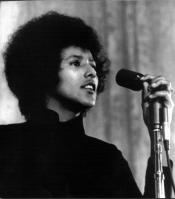
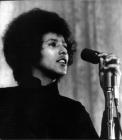


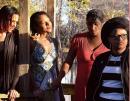

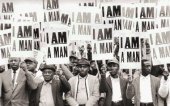
Parole e musica di Elaine Brown, l'unica donna ai vertici del Black Panthers Party tra il 1974 ed il 1977.
Nell'album “Seize The Time - Black Panther Party”, composto dalla Brown su richiesta del Movimento. Con The Pan-Afrikan Peoples Arkestra diretta da Horace Tapscott.
Non è certo una CCG questa, che il BPP aveva dichiarato guerra allo Stato razzista e alla sua polizia, ma è una canzone di resistenza: “Tutto questo silenzio finirà, non ci resta che prendere le armi e comportarci da uomini”. Allora era un'opzione che che divenne legittima per molti afroamericani, soprattutto dopo l'assassinio il 4 aprile del 1968 di Martin Luther King, emblema dell'altra via, quella non violenta.
Elaine Brown – abbandonata dal padre in tenera infanzia e cresciuta con grande fatica e dignità dalla madre - fu una dirigente delle Black Panthers, prima una sorta di ministro della cultura, poi la referente principale. Ma prese le distanze dal movimento già nel 1977, a causa del machismo e del paternalismo imperante al suo interno, dove nemmeno la violenza veniva risparmiata alle donne che non sottostavano alla cultura maschilista.
Nel 1969 e nel 1973 Elaine Brown realizzò due album per il BPP, “Seize The Time” e “Elaine Brown”
The Black Panthers felt that Oakland’s police force had targeted African Americans for harassment and brutality (violence). Group members bought guns and followed police officers around African American neighborhoods. They did not confront the police, but stated that they would protect African Americans who were unfairly attacked. These actions scared many Americans. The FBI created a secret program to stop the Panthers. Oakland police raids also resulted in the arrests and deaths of several Black Panther members.
The group also established programs to help African American communities. They established a free hot-breakfast program that eventually served 200 children a day. They also hosted reading lessons, summer school programs, and self-defense classes. Although the Black Panthers was a male-dominated group, they were also led by a woman for several years during the 1970s.
The Black Panther Party struggled to survive for over 15 years. Some of their leaders were accused of violence and imprisoned. Other leaders fled the country to avoid trial and others were killed by the police. In 1982, the group crumbled under the weight of unstable leadership, rumors of illegal activity, and declining membership.
(da Bower, Bert, et. al., “The Civil Rights Movements”. Teachers’ Curriculum Institute: California: 1999, pages 128-140).